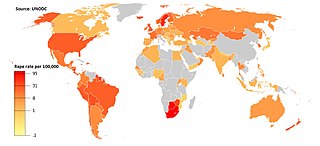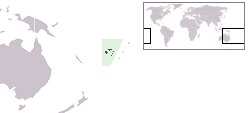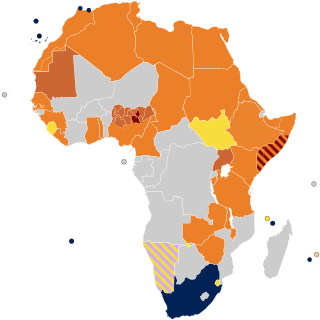Lesbian, gay, bisexual, transgender, queer, intersex, and asexual (LGBTQIA+) people frequently experience violence directed toward their sexuality, gender identity, or gender expression. This violence may be enacted by the state, as in laws prescribing punishment for homosexual acts, or by individuals. It may be psychological or physical and motivated by biphobia, gayphobia, homophobia, lesbophobia, and transphobia. Influencing factors may be cultural, religious, or political mores and biases.
The Mail & Guardian, formerly the Weekly Mail, is a South African weekly newspaper and website, published by M&G Media in Johannesburg, South Africa. It focuses on political analysis, investigative reporting, Southern African news, local arts, music and popular culture. It is considered a newspaper of record for South Africa.

Rape culture is a setting, as described by some sociological theories, in which rape is pervasive and normalized due to that setting's attitudes about gender and sexuality. Behaviors commonly associated with rape culture include victim blaming, slut-shaming, sexual objectification, trivializing rape, denial of widespread rape, refusing to acknowledge the harm caused by sexual violence, or some combination of these. It has been used to describe and explain behavior within social groups, including prison rape and in conflict areas where war rape is used as psychological warfare. Entire societies have been alleged to be rape cultures.

Lesbian, gay, bisexual, and transgender (LGBT) rights in Fiji have evolved rapidly over the years, however, LGBT people may still face legal challenges not experienced by non-LGBT residents. In 1997, Fiji became the second country in the world after South Africa to explicitly protect against discrimination based on sexual orientation in its Constitution. In 2009, the Constitution was abolished. The new Constitution, promulgated in September 2013, bans discrimination based on sexual orientation and gender identity or expression. However, same-sex marriage remains banned in Fiji and reports of societal discrimination and bullying are not uncommon.

Lesbian, gay, bisexual, and transgender (LGBT) people in South Africa have the same legal rights as non-LGBT people. South Africa has a complex and diverse history regarding the human rights of LGBT people. The legal and social status of between 400,000–over 2 million lesbian, gay, bisexual, transgender and intersex South Africans has been influenced by a combination of traditional South African morals, colonialism, and the lingering effects of apartheid and the human rights movement that contributed to its abolition.

Violence against women (VAW), also known as gender-based violence and sexual and gender-based violence (SGBV), are violent acts primarily or exclusively committed by men or boys against women or girls. Such violence is often considered a form of hate crime, committed against women or girls specifically because they are female, and can take many forms.
Statistics on rape and other sexual assaults are commonly available in industrialized countries, and have become better documented throughout the world. Inconsistent definitions of rape, different rates of reporting, recording, prosecution and conviction for rape can create controversial statistical disparities, and lead to accusations that many rape statistics are unreliable or misleading.

HIV/AIDS is one of the most serious health concerns in South Africa. The country has the highest number of people afflicted with HIV of any country, and the fourth-highest adult HIV prevalence rate, according to the 2019 United Nations statistics.

The Matthew Shepard and James Byrd Jr. Hate Crimes Prevention Act is a landmark United States federal law, passed on October 22, 2009, and signed into law by President Barack Obama on October 28, 2009, as a rider to the National Defense Authorization Act for 2010. Conceived as a response to the murders of Matthew Shepard and James Byrd Jr., both in 1998, the measure expands the 1969 United States federal hate-crime law to include crimes motivated by a victim's actual or perceived gender, sexual orientation, gender identity, or disability.

Haja Zainab Hawa Bangura is a Sierra Leonean politician and social activist who has been serving as the Director-General of the United Nations Office at Nairobi (UNON) since 2018, appointed by United Nations Secretary-General António Guterres. She served as the second United Nations Special Representative on Sexual Violence in Conflict with the rank of Under-Secretary-General of the United Nations from 2012 to 2017, in succession to the first holder of the post, Margot Wallström. In 2017 she was succeeded by Pramila Patten.

Lesbian, gay, bisexual, and transgender (LGBT) rights in Africa are generally limited in comparison to the Americas, Western Europe and Oceania.

Discussions of LGBT rights at the United Nations have included resolutions and joint statements in the United Nations General Assembly and the United Nations Human Rights Council (UNHRC), attention to the expert-led human rights mechanisms, as well as by the UN Agencies.
Corrective rape, also called curative rape or homophobic rape, is a hate crime in which somebody is raped because of their perceived sexual orientation. The common intended consequence of the rape, as claimed by the perpetrator, is to turn the person heterosexual.

The rate of sexual violence in South Africa is among the highest recorded in the world. Police statistics of reported rapes as a per capita figure has been dropping in recent years, although the reasons for the drop has not been analysed and it is not known how many rapes go unreported. More women are attacked than men, and children have also been targeted, partly owing to a myth that having sex with a virgin will cure a man of HIV/AIDS. Rape victims are at high risk of contracting HIV/AIDS owing to the high prevalence of the disease in South Africa. "Corrective rape" is also perpetrated against LGBT men and women.
Pierre Francois de Vos is a South African constitutional law scholar.
Arthur Kemp is a Rhodesian-born writer and the owner of Ostara Publications, a distributor of racist tracts, who was from 2009 to 2011 the foreign affairs spokesperson for the British National Party. He was born in Southern Rhodesia (Zimbabwe) and worked as a right-wing journalist in South Africa before moving to the United Kingdom in 1996.
The Cape Silicon Initiative or Silicon Cape is a regional ICT business networking NPO and community in the Western Cape, South Africa.
The Democratic Republic of the Congo (DRC) is a source and destination country for men, women, and children subjected to trafficking in persons, specifically conditions of forced labor and forced prostitution. The majority of this trafficking is internal, and much of it is perpetrated by armed groups and government forces outside government control within the DRC's unstable eastern provinces.

Matthew Buckland was a South African Internet entrepreneur and businessman who founded and exited digital agency and publisher Creative Spark, acquired in 2015 by UK firm M&C Saatchi PLC, the holding group of M&C Saatchi. Buckland was also the founder of Burn Media, a suite of technology publishing brands which includes Memeburn, Ventureburn.com, Gearburn.com and others.
Zethu Matebeni is a sociologist, activist, writer, documentary film maker, Professor and South Africa Research Chair in Sexualities, Genders and Queer Studies at the University of Fort Hare. She has held positions at the University of the Western Cape and has been senior researcher at the Institute for Humanities in Africa (HUMA) at UCT. She has been a visiting Professor Yale University and has received a number of research fellowships including those from African Humanities Program, Ford Foundation, the Fogarty International Centre and the National Research Foundation.










